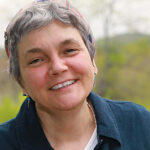This is an excerpt from Christian McEwen’s In Praise of Listening forthcoming with Bauhan Publishing (October 2023).
Writing takes time and silence, diligence, commitment: what Elizabeth Bishop once described as “a self-forgetful, perfectly useless concentration.”
There can be great terror in that concentrated focus, that prolonged self-forgetting. For Adrienne Rich, the impulse to create often began “in a tunnel of silence.” She struggled to find words for what it meant to her, “a sensation that feels sometimes buoyant and sometimes earthbound, sometimes like lighting fires in snow, sometimes like untying knots in which you have been bound.” If, as she said, “poems are made of words and the breathing between them,” for a long time, breath alone was all she heard.
For the Russian poet Osip Mandelstam, and for his friend Anna Akhmatova, a poem began with a musical phrase ringing insistently in the ears: at first random and opaque, then gradually more focused and precise. Such intrusive music wasn’t always comfortable. In her memoirs, Nadezhda Mandelstam describes her husband trying to exorcize this kind of hum. “He would toss his head as though it could be shaken out like a drop of water. . . . But it was always louder than any noise, radio or conversation in the same room.”
Writing takes what Elizabeth Bishop once described as “a self-forgetful, perfectly useless concentration.”
Gary Snyder is more welcoming. “I listen to my own interior mind-music closely,” he says. Most of the time, he hears nothing of great interest. But once in a while, there will be something he recognizes as “belonging to the sphere of poetry.” And then he listens with enormous care, giving the poems plenty of time to ripen before he actually writes them down.
It was Robert Frost who came up with the phrase “the audile imagination,” or what he sometimes called “the imagination of the ear.” By this, he meant the act of listening to a work-in-progress, attending to what the work is trying to say. If a handful of phrases feels alive and energizing, the writer may be able to build out from them, hearing his way forward, following the linked meanings and associations, and weaving in yet more rhymes and echoes, too.
There is a kind of magic in this, touching in on the place that seems most vivid, and revising accordingly. Critical intelligence is involved, but there is a tactile quality, too, a sense of physical rightness. “A good shovel fits the hand and foot,” writes Robert Bringhurst, “and a good sentence fits the voice. . . . A sentence or a paragraph that pays no attention to the reach and rhythm of the voice is uncomfortable or painful, like a shoe that doesn’t fit the human foot or a glove on the wrong hand. But a sentence that does fit the anatomy of voice and breath will touch, through them, some other rhythms of the body: those of the heart and hands and feet, and of the memory and mind. The limbs—the arms and legs—in Greek, are meloi.
And that, he tells us, “is the root of the word melody in English.”
I put the shell down and wait for the snail
Joseph Stroud
to emerge. I have much to learn of patience.
I no longer wonder where did love go,
or why the nights are so long. Issa says
the words will find a way across the page,
they will make a path into morning.
A Writing Exercise
Where does poetry come from? Listening inwards, paying attention; memory, imagination, dream. . . . There really are no wrong answers. Start by proposing the question and listen carefully to what your students have to say, writing up their answers on the board.
Then introduce some of the poets in the essay: Robert Frost, Elizabeth Bishop, Adrienne Rich, even Osip Mandelstam. Write up their names, too, and say a little about their lives and work. You might want to read one or two of their poems or display copies of their books.
Finally, use the quotes to “story-tell” about the poets’ own experience. Write up some of their phrases, perhaps using a different color: “a tunnel of silence,” “interior mind-music,” “a self-forgetful, perfectly useless concentration,” and use these as a basis for discussion.
Most of us struggle to find words when we begin to write and are able to identify well with Rich’s description, “sometimes like lighting fires in the snow, sometimes like untying knots in which you have been bound.” Ask your students if this feels true for them. Some may have their own experience of “audile imagination” and know how it feels to inch their way forward as they write, following the linked meanings and associations.
Such a discussion can be invigorating in and of itself, reminding everyone that writing is a full-bodied experience, different for each one of us. It can also serve as the catalyst for a poetry assignment. Joseph Stroud’s little poem offers a useful model here. Say a few words about the Japanese haiku-master Issa by way of introduction, and then read the poem aloud. Ask your students what they hear. This, too, is a poem about patience and creativity, learning to write, learning to listen, learning to trust. Can they come up with just such a poem of their own?
Read more from this series:
• “Small Sounds of the Past“
• “Listening Empty“
• “Willing to Listen“
Footnotes:
“a self-forgetful, perfectly . . .” Elizabeth Bishop in a letter to Anne Stevenson, in Mark Doty, The Art of Description (Greywolf Press, 2010), p. 23.
“in a tunnel of silence . . .” Adrienne Rich, Arts of the Possible: Essays and Conversations (W.W. Norton 2001), p.150.
“ a sensation that . . .” Adrienne Rich, What is Found There: Notebooks on Poetry and Politics (W.W. Norton, 1993), p.49.
“poems are made . . .” Rich, ibid., 2001, p.113.
“He would toss . . .” Nadezhda Mandelstam, Hope Against Hope: A Memoir (Penguin Books, 1975), p.82.
“I listen to . . .” The Poet’s Work: 29 Master of 20th Century Poetry on the Origins and Practice of their Art, edited by Reginald Gibbons, (Houghton Mifflin, 1979), p. 284.
“belonging to the . . .” Gibbons, ibid., p. 284.
“the audile imagination . . .” Buhner, ibid., p. 327.
“the imagination of the ear . . .” Buhner, ibid., p. 328.
“A good shovel . . .” Bringhurst, ibid., 2006, p.47.
“I put the shell . . .” Joseph Stroud, “Cathedral,” Country of Light,poems by Joseph Stroud (Copper Canyon, 2004), p. 87.
Christian McEwen is a freelance writer and workshop leader originally from the U.K. She is the author of several books, including World Enough & Time: On Creativity and Slowing Down, now in its eighth printing. She edited Jo’s Girls: Tomboy Tales of High Adventure; Sparks from the Anvil: the Smith College Poetry Interviews; and, with Mark Statman, The Alphabet of the Trees: A Guide to Nature Writing. Christian has enjoyed residencies at Yaddo, MacDowell, Mesa Refuge, and the Virginia Center for the Creative Arts, and has received a fellowship in playwriting from the Massachusetts Cultural Council. Her new book, In Praise of Listening, will be published in October.



